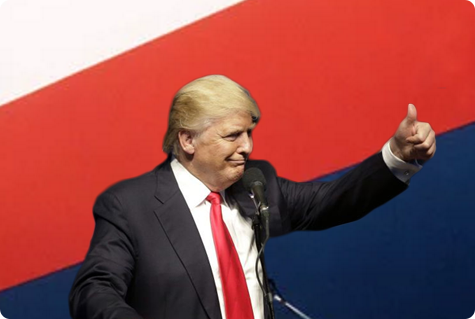
The US Administration and Its Position on Important Issues*
It may be difficult to determine the repercussions of “America First” and map how it is apparently carried out in a world that largely depends on complex geopolitics and economics. Could this mean, for example, that the United States will only look after its own interests, and that other countries must worry about their own security and development? If that is the case, then we need to identify areas for cooperation and sources of disagreement as well.
On the other hand, what about combating urgent global ills like the Islamic State and international terrorism? Or what about the status of international institutions such as the United Nations, the International Monetary Fund and the World Bank, among others, whose political, economic and global security structures were built after World War II?
If we do not have effective platforms for addressing global challenges, we must ask who will provide a global vision to tackle these issues, and how. This is critical, especially given that this vision must address urgent humanitarian challenges such as human rights violations, cybercrime, nuclear proliferation, global warming, electronic threats, water shortages, population growth and global trade wars, among others.
So far, “America First” risks being interpreted as “America is strong, and it will be ‘America Alone’ if necessary.” That is not, by the way, isolationism as many see it. Rather, the new administration is saying to you: “Give in to my demands because I need to focus only on my interests and my domestic challenges.” One cannot be so naive as to expect the United States to carry the full weight of addressing these humanitarian challenges alone while others stand on the sidelines. Yet it is also not right that countries only look after their own personal interests at the expense of global security and stability. With the Trump administration, there is a new discourse. We all need to understand this discourse in all its complexity and limitations so that we can determine our priorities as global citizens.
Trump’s approach did not emerge from a vacuum. Rather, it was a reflection of the true needs and fears of the American people. This cannot be disregarded as trivial populism, nor as being limited to the geographic United States alone, since U.S. economic, political and military elements exert a major influence on global changes. This is true whether Trump is on the political stage or not. We also must not forget that there are similar political movements underway in Europe.
The United States’ unilateral behavior in many important matters in the aftermath of the tragedy and terrorist acts on 9/11 cannot be forgotten. This behavior clearly translated into President George W. Bush’s decision – unsupported by international law – to invade Iraq in 2003, President Barack Obama’s widespread use of armed drones, and President Trump’s decision to withdraw from the nuclear deal with Iran despite the strong opposition of the other five major signatories.
One can discern some characteristic features of President Trump’s foreign and international policy. First, he deals with issues more as time-bound deals than as long-term strategies. His approach views short-term gains as more important than the long term gains. Thus, countries can change their minds quickly and walk away from any agreement because the consequences are limited. Unilateralism and risk-taking are becoming intertwined with U.S. policy. Perhaps President Trump will walk away from many of his predecessor Obama’s commitments and programs.
It may be useful to point out that President Trump is also influenced by his personal relationships. This highlights the importance for other political leaders of dealing with him at arm’s length.
In addition to the features described above, there are other defining characteristics of this administration, such as its focus on short-term interests at the expense of strategic relationships and its demand that others pay for protection by, and cooperation with, the United States. Moreover, the United States must receive financial benefits from these political deals as well as domestic job protection. This means that the United States is saying to other countries and international bodies, “Money and economics are more important to me than anything else. We will cooperate minimally with these countries and international bodies and keep it to a tactical and limited level.”
Here we note the United States’ efforts to display its military and financial strength on the world stage. It may be that the importance of money trumps political and military power. We must not forget that President Trump is following in the footsteps of other American presidents who considered the United States the strongest player in the world. Like his predecessors, Trump is prepared to impose his policies through a combination of unilateralism, sudden moves and soft and hard strength. Sometimes this leads to the desired outcome, but in the worst case, it may deter others and make them think twice about going beyond American interests. Some may say that Trump’s approach has already yielded some fruit such as the United States’ bilateral deals with several large countries and the initially positive results on the North Korean issue.
Recently in Syria, Trump did what his predecessor did not, when, from its point of view, the U.S. administration responded appropriately and effectively to the tools that the Damascus regime used to carry out chemical attacks on its citizens. In the cases above, Trump broke the status quo and imposed his personal mix of soft and hard power. However, there is a chance that this fierce approach will affect the United States’ credibility over the longer term, as with the situation involving the withdrawal from the Paris climate agreement. It will be a very long time before humanity sees the fruits of this agreement, or the challenges of global trade and trade agreements.
On the other hand, one might see these matters as bluffs that will not bear fruit. That is the situation with Trump’s presidential campaign promise to build a border wall with Mexico. Let us not forget that the mechanisms of the U.S. government are complicated and extensive. Carrying out any new policy requires time for it to be digested, analyzed and applied.
This new sign of the times is not yet well-known, and thus, has not been taken into account by many global ‘players.’ We hear a lot of intimidation and loud statements, but we do not yet see any direct effects from them.
It is clear that this new combative approach by American leaders toward complex regional issues might mean that some will try to weigh the benefits gained from this approach against how important it is to take such a position.
In this general situation and in our region specifically, Saudi Arabia and Israel are the two principle regional players trying to benefit from the aggressive and ambitious policies of the new White House occupant. The best example of this is the attempt to solve the Palestine issue once and for all. Similarly, we see the crowds gathering to focus their efforts against Iran as if it were the main source of instability in the region.
It is worth noting that the Trump administration, even more so than its predecessor, sees the Middle East from a Saudi and Israeli perspective. On the other hand, the United States does not yet need Middle East oil. Perhaps the U.S. will not find itself committed again to following the previous approach of protecting its allies’ interests. Currently the United States does not see the region’s countries from the perspective of having shared interests. More than anything else, it sees the region as a market in which to sell American weapons. When looking at America from the outside, one cannot ignore the fact that after 9/11, the United States was no longer the center of power it was in the past.
We may see challenges such as a new cold war that is expected to be launched against the United States by its competitors. Then, war over technology or a cyberwar, or at least serious skirmishes, will erupt more frequently.
While the United States cannot claim a total monopoly on the electronics field, its competitors like China and Russia (to name two) are not deficient or weak in this area. Unilateral decisions and action by America may lead to the sudden loss of friends and allies, such as those in Europe.
Over the long term, this trend will have a negative influence on global security.
Europe, and especially Germany, the United Kingdom and France, will try to manage its own affairs and security far removed from its traditional partner across the Atlantic. In the future, we may see more frequently that the Europeans will be unable to depend on American support in security, environmental, regional or international disasters. As we know from international policy history, Russia, China and others will look for a chance to exert their influence, and as a result the United States will lose some of its global influence and its role as the world's leading power. Therefore, other countries will not focus solely on the importance of U.S. interests and its threats. In turn, this means a reduction in both U.S. competitiveness and global security.
As for what we can see as important changes in Washington today, like any observer, we will not be able to predict anything the new president might do. A poor understanding of the details behind others’ decisions and a lack of confidence that Trump will think of our interests, too, make both friend and foe worry. He does not rely on a ‘win-win’ approach for all parties. This is especially true when evaluating the intended and unintended consequences of American actions. Enemies and allies do not always understand these actions and each party will interpret U.S. signals differently depending on its own personal interests.
Finally, we will look at the situation from an academic perspective. In management science and business, there is a theory called “disruptive innovation.” It posits a type of innovation undertaken to create new markets and value networks, leading to a disruption in the current market and value network. It may displace established companies and market leaders. This innovation creates a state of chaos or disruption.
The term was first defined and analyzed by American researcher Clayton Christensen in 1995. It is named after an extremely influential business idea at the start of the 21st century. Of course, not every disruption creates chaos or imbalance in the market even if it is a revolutionary disruption. Rather, the type of disruption that creates chaos comes from entrepreneurs and businessmen, rather than from leading and established companies. This is because disruptions are not profitable enough at the beginning, and developing a disruptive innovation depletes limited resources that are required in order to compete against the current competition.
A disruptive process can take longer to develop than the conventional approach and the risk associated with it is higher than other more incremental or evolutionary forms of innovation.
Is it possible that with the Trump administration we are seeing a new type of approach to American policy? Could the theory above correspond to how Trump’s approach is being executed? Time will tell, given that there are huge internal challenges facing the president, including great indignation against Trump’s style of doing business.
The author, Lukman Faily, served as Iraq’s ambassador to the United States from July 2013 to June 2016.
*Editor’s note: This is the first of a two-part series. The second part will be published shortly.


